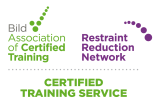BILD ACT Restraint Reduction Network (RRN) Certified Physical Intervention, PMVA Training
The NHS statutory training requirement
Training in Physical Intervention (PMVA) must be BILD ACT Restraint Reduction Network (RRN) certified. i.e. If your staff are working with service users who may require physical interventions & you are commissioned by the NHS, you must have BILD ACT certified training.
This applies to permanent, temporary and agency staff.
The CQC statutory training requirement
Training in Physical Intervention (PMVA) must be BILD ACT Restraint Reduction Network (RRN) certified. i.e. If your staff are working with service users who may require physical interventions & the setting is subject to CQC inspection, you must have BILD ACT certified training.
This applies to permanent, temporary and agency staff.
The Agency Framework training requirement
Staff are now required to complete BILD ACT Restraint Reduction Network (RRN) certified Physical Intervention training, & must be able to provde a current certificate of competence. This applies to any staff member working in NHS commisissioned or CQC inspected services, who may have to use physical interventions (PMVA).
We come to you!
Your 3 day BILD certified course will be tailored to the exact needs of your service, through a detailed Training Needs Analysis. All training is focussed on restraint reduction and preventative strategies. We will teach your team BILD ACT RRN certified Positive Behaviour Support (PBS), Managing Challenging Behaviour, De-escalation, Breakaway skills & Restrictive Physical Interventions (restraint/PMVA) to safely hold people at risk of harming themselves or others.
Day 1 - Positive Behaviour Support (PBS) Training
Positive Behaviour Support (PBS) is the most valuable tool when dealing with behaviours of concern and is the primary route to ensuring restraint reduction.
PBS training gives staff skills to:
- free people from harmful and challenging behaviours
- change the way such behaviours are viewed by others
- develop skills and knowledge to improve the way your service users live their lives
Delegates will learn how to develop positive proactive strategies to support their service users and prevent challenging behaviours before they occur.
They will learn and about and understand the PBS Competency Framework, assessments, evaluations and planning, on both a proactive and reactive basis.
Day 1 Information
- 7 hours of training
- Delivered in-house
- Maximum of 18 delegates per trainer, (although we recommend 12 as a group size)
- Suitable for all settings
Day 2 - Managing Challenging Behaviour and Breakaway Training
Staff will learn about behaviours that challenge and some effective strategies to avoid them.
They will be taught to:
- recognise triggers and cues prior to behaviour escalating
- understand what happens to the human body when faced with fear and conflict
- best to communicate with service users to reduce the likelihood of conflict through de-escalation skills.
Delegates will be taught simple and effective breakaway techniques for both low and high risk situations when managing behaviours of concern and the laws that govern them.
All teaching is conducted with a constant emphasis on restraint reduction and preventative strategies.
Day 2 Information
- 8 hours of training
- Delivered in-house
- Maximum of 18 delegates per trainer, (although we recommend 12 as a group size)
Day 3 - Restrictive Physical Intervention Training
Delegates will learn 'control & restraint' and physical intervention skills.
They will only be taught techniques identified as necessary in their Training Needs Analysis (TNA).
Typical course content includes:
- The use of force
- Health and Safety and Human Rights legislation
- Management of Health and Safety at Work Regulations
- Avoiding and detection of positional asphyxia
- Instruction and practice of low risk physical intervention techniques.
All teaching is conducted with a constant emphasis on restraint reduction and preventative strategies.
Day 3 Information
- 8 hours of training
- Delivered in-house
- Maximum of 12 delegates per trainer. A second trainer will be provided for day 3 when required
- RRN Certified
















